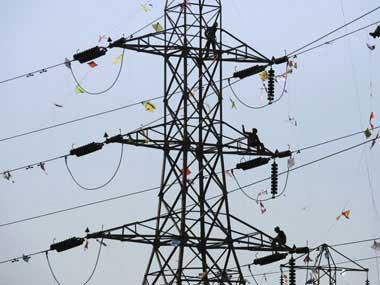In a political culture that places a premium on - and is rewarded by - pandering to the lowest common denominator of populism, genuine reform happens not from an informed and reasoned application of mind. It happens only when the firing squad lines up, and takes aim.
The plan that the UPA government unveiled on Monday to bail out State electricity distribution companies, based on the recommendations of the BK Chaturvedi panel’s recommendations, is the surest sign that the government has heard the executioner’s song.
Of all the measures that the government announced in recent days - which were somewhat hyperbolically characterised as ‘reforms’ - the Rs 1.9 lakh crore plan to pull discoms back from the brink of bankruptcy is perhaps the most significant, with perhaps the most profound implications. In many ways, the failures on the power distribution front have come to symbolise everything that is wrong with the power sector - and, given the centrality of power in sustaining the economy, with the larger India story.
[caption id=“attachment_462597” align=“alignleft” width=“380”]
 The bailout of discoms should spur investments in this sector. Reuters[/caption]
The bailout of discoms should spur investments in this sector. Reuters[/caption]
Given that the discoms were technically insolvent - they were borrowing just to pay off the interest on earlier borrowings - and couldn’t even raise working capital, the risk that the India Story would have its shining lights switched off sooner or later was very real. You could already see signs of it in the eight-hours-a-day power cut in cities and towns across India, and in the fact that entire grids were collapsing owing to overdrawals by States to meet soaring demand.
Monday’s decision has the capacity to revive investments in a sector that is critically important, but where investments had been inhibited by the mountain of debt that is at risk of going bad. Private power companies, which had been tied up to the fortunes of the discoms, who are their only customers, too will find enormous relief.
Impact Shorts
More ShortsUnder the terms of the bailout, State governments, which contributed to the crisis by not raising tariffs in time, will be required to take up about half the outstanding loans of the State electricity boards (SEBs); the rest will be rescheduled by lenders, mostly public sector banks, with a three-year moratorium on principal repayments.
Of course, some State governments are already squealing in agony, and claiming that they cannot really absorb even 50 percent of the accumulated losses because they are already in way over their heads in debt. But, as they will soon realise, karma is cruel, and profligacy comes with a price tag, even if it comes late.
But the success of this effort to restore discoms to financial health hinges so critically on the various players, particularly State governments, conducting themselves responsibly. As part of the ‘bailout’ proposal and the restructuring of loans, discoms and the State governments must commit themselves to annual revisions of power tariffs - and to bringing in private participation in distribution. The last time that SEBs were offered a one-time settlement of their dues, they were similarly told to get their books in order, but the good conduct lasted only a short while.
Discoms have been lax in cutting back on power theft, and even checking transmission losses. State governments, on their part, have found it impossible to resist the resort to populist politics - which is channelled in providing free power to the agricultural sector. Unless these leakages and inefficiencies are addressed, this bailout will not serve the purpose - and SEBs and discoms may require to be bailed out a few years hence. This could be the weakest link in the success of the bailout package.
The provision requiring private sector participation in distribution is also significant. However, opinion appears to be divided on whether the private participation will be on the franchise model or the PPP model: the two expert groups that had gone into the issue came out with incongruent recommendations. The VK Shunglu committee, for instance, had recommended the franchise model, but the Chaturvedi commission had recommend the PPP model on the grounds that the franchise mode would not be able to ensure financial stability of the sector, and would prove incapable of bringing in adequate capital investments.
For customers, all this, of course, means one thing: higher tariffs, particularly in States where there is a backlog of tariff revision to be cleared. The reflexive instinct of governments to finally stick the tab on the consumer - without offering anything by way of quality service - is of course reprehensible. But underpricing utilities is hardly a solution; it is short-sighted, and as has been demonstrted, it is this short-termism that has inhibited investments into the sector, which in turn could have imparted efficiencies, from which consumers can benefit.
Successive governments at the State and Central levels have stretched populism to their breaking point. Monday’s decision marks the beginning of a reversal of that failing. But for this proposal to succeed, governments and discoms must be held accountable for their commitments - and not use this opportunity provided by the cleaning up of their books as a starting point for another round of populist profligacy.
Venky Vembu attained his first Fifteen Minutes of Fame in 1984, on the threshold of his career, when paparazzi pictures of him with Maneka Gandhi were splashed in the world media under the mischievous tag ‘International Affairs’. But that’s a story he’s saving up for his memoirs… Over 25 years, Venky worked in The Indian Express, Frontline newsmagazine, Outlook Money and DNA, before joining FirstPost ahead of its launch. Additionally, he has been published, at various times, in, among other publications, The Times of India, Hindustan Times, Outlook, and Outlook Traveller.
)